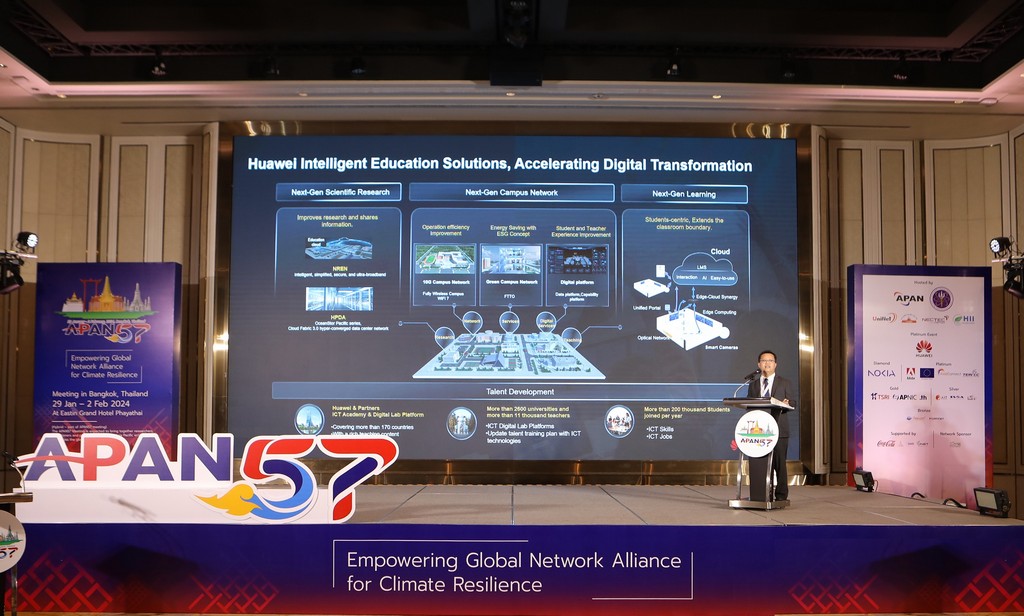This site uses cookies. By continuing to browse the site you are agreeing to our use of cookies. Read our privacy policy>![]()
This site uses cookies. By continuing to browse the site you are agreeing to our use of cookies. Read our privacy policy>![]()
Enterprise products, solutions & services

Huawei joins APAN57 for the first time in Thailand, showcasing its vision and embracing next-generation education technologies.
Bangkok, Thailand, 31 January 2024 – Huawei inspired the education sector to upgrade its infrastructure by unveiling its enterprise-class "AirEngine Wi-Fi 7", the latest generation of Wi-Fi standards solutions that offer a smoother and more reliable wireless network in high-density, high-bandwidth, and low-latency use cases, such as when accessing the metaverse and utilizing Augmented Reality/Virtual Reality (AR/VR) for education.
"The trend in the education industry is now evolving from digitalization to intelligent infrastructure,” stated Mr. Sheldon Wang, Vice President of Enterprise Business Group, Huawei Technologies (Thailand) Co., Ltd. He went on to reveal during the 57th Asia-Pacific Advanced Network (APAN57) meeting that Huawei is fully committed to integrating ICT such as connectivity, cloud computing, big data, and artificial intelligence throughout the entire education process to promote innovation in teaching, scientific research, management, and services.
Based on technologies such as optical network and Wi-Fi 7, Huawei has integrated wired, wireless, office, and IoT networks to connect campus networks, education and research networks, and the Internet. This builds a single secure, stable, and intelligent network, improving the bearing capabilities of the service system as well as the user experience.
Teaching and learning activities today have shifted from using traditional blackboards to multimedia tools, from learning in a fixed location to anytime, anywhere, as well as from one-way lecturing to more student-centric learning. Scientific research too needs to solve complex computing and analytics tasks and relies more on technologies like high-performance computing (HPC), high-performance data analytics (HPDA), big data, and artificial intelligence, all of which require high-bandwidth and stable Wi-Fi solutions. Huawei is prepared to bring knowledge and expertise from its global industry work to support the development of ICT infrastructure, which it sees as a key factor in the digital transformation of the education sector, along with key solutions such as "Intelligent Education" that will accelerate digital transformation that focuses on technology that supports research.
Huawei organized a special forum "Thailand Medical Research HPDA Infrastructure Innovation Panel" at APAN57, inviting experts from leading medical universities including Khon Kaen University (KKU), Siriraj Hospital, National Biobank of Thailand, and King Mongkut's Institute of Technology Ladkrabang to exchange ideas and preparedness guidelines to support the development of scientific and medical research. Huawei's Scientific Research HPDA Solution adopts an ultra-high-density design — both in terms of capacity and performance — to make significant savings in equipment room space, bringing down the Total Cost of Ownership (TCO). The seminar was led by Mr. Prayuth TungsaNgob, Huawei Thailand's Chief Technology Officer of Enterprise Business.
Huawei also participated in the presentation of technology and innovations for education at APAN57, which was held under the theme "Leading Infrastructure to Accelerate Education Intelligence", focusing on infrastructure upgrades to accelerate technology transformation that will support the next generation of education.
Huawei offers a range of solutions to support technology infrastructure upgrades, including the latest in wireless network standards, the Huawei Air-Engine Wi-Fi 7, which delivers high bandwidth and supports e-classrooms that can use HD video and audio for teaching. The Huawei Air-Engine Wi-Fi 7 delivers realistic interactivity in addition to technologies that can set a strong foundation to support the next generation of teaching and learning, such as Converged Campus Network and Scientific Research HPDA, which feature advanced computing and energy-saving capabilities, as well as environmental friendliness. Huawei plans to promote the industry holistically under the Digital Talent Ecosystem and will continue to cooperate with policymakers and partners to cultivate 50,000 talents in Thailand by 2027.